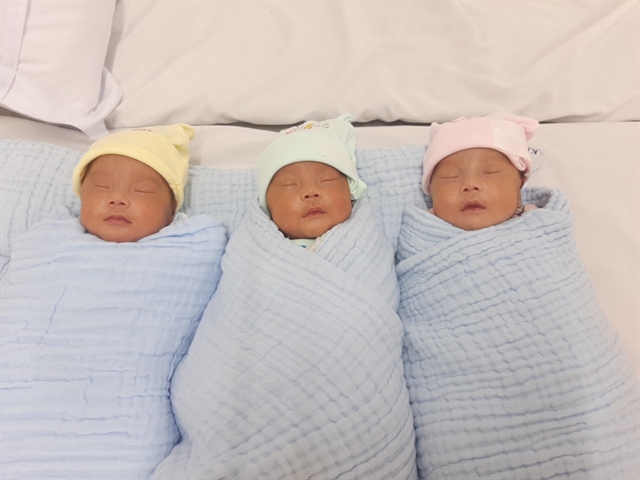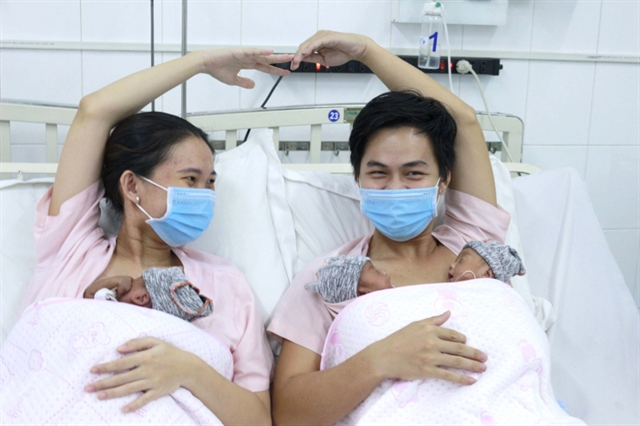 Society
Society

Triplets were born prematurely at 27 weeks in an unstable health condition. But for the medical staff at the Obstetrics Hospital of Cần Thơ City, nothing was going to stop them ensuring the newborn baby girls all pulled through, not even the fact that this was the peak of the COVID-19 pandemic

|
| Triplets were born prematurely at 27 weeks — Photo cand.com.vn |
CẦN THƠ — In late July this year, the Obstetrics Hospital of Cần Thơ City welcomed three very special deliveries.
Triplets were born prematurely at 27 weeks in an unstable health condition. But for the medical staff at the hospital, nothing was going to stop them from ensuring the newborn baby girls all pulled through, not even the fact that this was the peak of the COVID-19 pandemic
Carrying three babies during pregnancy is extremely rare and it is estimated it only happens around once in every 10,000 pregnancies. Often, the babies are born much earlier than expected.
Being in the fourth wave of the COVID-19 pandemic of Mekong Delta localities, Như Yến (not her real name), 24 years old and her husband were anxious at the timing of their new arrivals.
Yến began going into labour on July 23 in the 27th week of her pregnancy. Doctors told her she needed to have a Caesarean Section as this was the best option to give the babies a fighting chance of survival.
The three were born weighing just 1.03 kilograms, 1.06 kilograms and the smallest just a single kilogram.
Nguyễn Thị Ngọc Hà, head of Department of Paediatrics – Neonatology, said three doctors were in the theatre to perform the complicated medical procedures. After their situation got stable, the triplets were sent to the neonatal intensive care unit.
Leaving the mother's womb early, the babies faced a lot of health risks after birth. They needed to be assisted with a ventilator to help them breathe and also suffered from sepsis requiring high-level antibiotics, she said.
In the first days after the birth, doctors worked hard in a strenuous atmosphere and took various measures to give special care for the babies.
The babies were fed through intravenous lines. From the second week, they were trained to suck breast milk from their mother. At the very first meals, the babies could not eat much, just the odd drop of milk.
Three weeks after birth, when the triplets’ respiratory systems were stable, the babies and the mother could meet for skin-to-skin contact.
Yến told Công An Nhân Dân (People’s Public Security) newspaper: “When the health of my babies improved, the doctors told me to hold them on my chest to transmit warmth to them, making up for the days when they had to leave the mother's womb early.
“Being able to hold my baby in my arms, hear the heart beat of myself and my babies, I finally felt a close connection.”

|
| Yến and her husband hold the babies on their chests following the Kangaroo care method. — Photo cand.com.vn |
Behind blockade fence
The Obstetrics Hospital of Cần Thơ City was locked down from September 27 after community cases were detected there.
Doctors and nurses then suffered from pressure of taking care of mothers and newborns and at the same time ensuring pandemic’s safety.
Behind the blockade fences, medical staff still worked non-stop.
The triplets were paid more special attention to.
Dr Hà said doctors and nurses worked at 200 to 300 per cent of their normal capacity.
“To ensure the utmost safety for premature babies with extremely weak resistance, doctors must take strict precautions,” she said.
As the days passed, the newborns began to breathe by themselves, eat more milk, sleep more and gain weight.
The joy felt by their parents was shared by the medical staff.
During her two-month stay at the hospital, Yến was instructed how to carry the babies and warm them up with the Kangaroo method.
Kangaroo care is a way of holding a baby that involves skin-to-skin contact. The baby, who is typically naked except for a diaper, is placed in an upright position against a parent's bare chest. Both mothers and fathers can do kangaroo care.
September 28 was a special day for Yến and her babies when the hospital’s lockdown was lifted and she could go home after 64 days.
Each baby had gained one more kilogram by the time they were discharged.
Yến said the Department of Paediatrics - Neonatology had become her home and the doctors and nurses were just like her relatives.
“This is the place where my children first came to know this world, where they were fully embraced,” she said.
Yến gave her babies nicknames at home Cô Na, Cô Vi and Cô Covid so that when the babies grow up, the story of triplets born during the COVID-19 pandemic will be remembered by them forever. — VNS